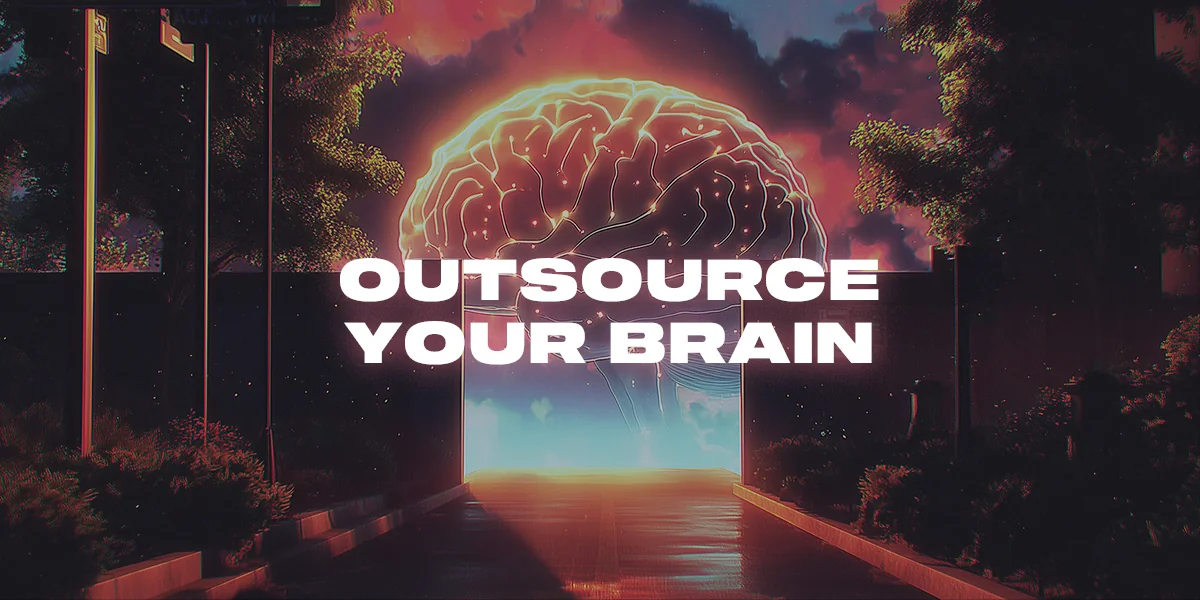Ever wondered if all these AI tools are making you sharper-or just a little lazier? If you've ever Googled an answer you could have figured out, you're not alone. Here's the uncomfortable truth: the more we let AI do the thinking, the more we risk losing our own edge.
Let's dig into the real cost of "outsourcing our brains"-and how to use AI without letting it use us.
🧭 Why This Matters: The Hidden Danger of Easy Answers
This isn't just another "AI is coming for your job" post. It's about something closer to home: your ability to think, solve, and learn in a world that's getting smarter-and lazier-by the second.
By the end of this post, you'll know how to leverage AI for growth-without letting your mind turn to mush.
💡 The Riddle Trap: How AI Exposes (and Worsens) Our Mental Shortcuts
We all love a shortcut. But here's the kicker: Most of us get classic riddles wrong-not because we're dumb, but because our brains are wired for quick, intuitive answers. AI gives us solutions instantly, which feels great… until we realize we're not flexing our own mental muscles.
- Ever answered, "How many months have 30 days?" (Did you say "four"? It's actually all twelve.)
- Or the classic: "A bat and a ball cost 110 rupees; the bat costs 100 more. How much is the ball?" (If you said "10," you're in good company-but the answer is "5.")
AI can widen this crack in our thinking by making shortcuts the default.
The more you let AI think for you, the less you practice thinking for yourself.
🧠 The Real Bottleneck: It's Not Information-It's Interest and Motivation
For centuries, every new tech-books, radio, MOOCs-was supposed to "revolutionize learning." Did it? Not really. Information is everywhere; what's rare is the desire to learn and the drive to keep going.
AI can hand you answers, but it can't make you care. Interest is built through conscious experience; motivation comes from challenge and guidance. If AI becomes your crutch, you risk missing out on both.
- Motivation isn't built by scrolling ChatGPT.
- Real learning happens when you struggle, question, and connect new dots yourself.
Tech can scale access, but it can't scale your curiosity.
⚙️ The Hammer, the Nail, and the Parking Lot: Why Tech Isn't Always the Answer
If the only tool you have is a hammer, everything looks like a nail. We're obsessed with tech solutions-even when a simple, creative fix would work better.
Example: A crowded parking lot. Tech solution? Install sensors and build an app. Creative solution? Tie a helium balloon to each empty spot.
AI is a powerful tool, but it's not always the right one. Sometimes, the best answer is the simplest one-if you're willing to think beyond the algorithm.
Don't let technology limit your imagination-let it expand it.
🧪 The AI Tutor Paradox: Why Prompts Matter More Than You Think
Imagine an AI tutor that only nudges you, never gives away answers. Sounds ideal, right? Here's the catch: the tutor only worked because someone told it how to help. If you don't know what you need, you can't prompt the AI to teach you well.
- Students rarely know how to ask the right questions.
- You can't map a journey if you've never been to the destination.
AI isn't a magic teacher. It's a mirror-reflecting the quality of your questions and intentions.
The value of AI depends on the clarity of your own thinking.
🏗️ Building Your "Web of Knowledge": Why Experience Beats "General Skills"
Forget "general problem-solving skills." What actually helps you solve problems? A rich, interconnected web of knowledge, built from real experience.
- You catch a ball not by calculating its arc, but because your body remembers gravity.
- You find shortcuts in life because you've walked the long way before.
If you let AI do all the heavy lifting, your "web" gets thin-and your intuition gets rusty.
Real smarts come from connecting your own dots, not just collecting answers.
🔥 How to Stay Sharp: Conscious Learning in the Age of AI
Here's how to use AI as a tool-not a crutch:
- Make learning just hard enough. Print riddles in a weird font. Tackle problems before you Google. Challenge triggers deeper thinking.
- Focus, don't multitask. Break AI sessions into small, focused chunks. Your brain learns best when it's not overloaded.
- Use AI to search, not to shortcut. Let it guide your curiosity, but do the wrestling yourself.
Growth happens when you engage, not when you coast.
🧭 The Teleporter Test: Will You Know What to Do When Shortcuts Disappear?
Imagine you could teleport anywhere-but one day, the teleporter breaks. Would you remember how to get from A to B the old-fashioned way?
AI is your teleporter. It's fast, easy, and addictive. But if you forget the journey, you'll be lost when the shortcut's gone.
The skills you build today are what carry you when the shortcuts vanish.
💭 Your Turn: Stay Sharp
What's one way you'll challenge your own thinking this week-without reaching for AI first? The future belongs to those who can think alongside machines, not just think through them.
Use AI to amplify your curiosity, not replace it. The smartest people won't be those who know how to prompt AI-they'll be those who know when not to.
